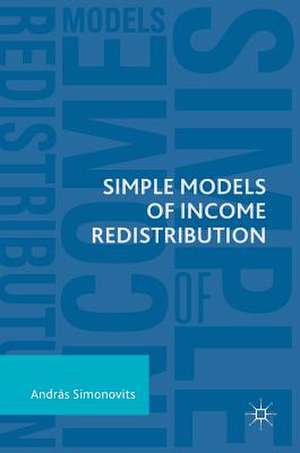Simple Models of Income Redistribution
Autor András Simonovitsen Limba Engleză Hardback – 4 iun 2018
The book will be of value for graduate students and researchers interested in public economics, especially in public and private pensions.
| Toate formatele și edițiile | Preț | Express |
|---|---|---|
| Paperback (1) | 582.30 lei 6-8 săpt. | |
| Springer International Publishing – 25 dec 2018 | 582.30 lei 6-8 săpt. | |
| Hardback (1) | 730.35 lei 6-8 săpt. | |
| Springer International Publishing – 4 iun 2018 | 730.35 lei 6-8 săpt. |
Preț: 730.35 lei
Preț vechi: 890.66 lei
-18% Nou
Puncte Express: 1096
Preț estimativ în valută:
139.75€ • 145.63$ • 115.71£
139.75€ • 145.63$ • 115.71£
Carte tipărită la comandă
Livrare economică 03-17 aprilie
Preluare comenzi: 021 569.72.76
Specificații
ISBN-13: 9783319725017
ISBN-10: 3319725017
Pagini: 228
Ilustrații: XVIII, 292 p.
Dimensiuni: 148 x 210 mm
Greutate: 0.52 kg
Ediția:1st ed. 2018
Editura: Springer International Publishing
Colecția Palgrave Macmillan
Locul publicării:Cham, Switzerland
ISBN-10: 3319725017
Pagini: 228
Ilustrații: XVIII, 292 p.
Dimensiuni: 148 x 210 mm
Greutate: 0.52 kg
Ediția:1st ed. 2018
Editura: Springer International Publishing
Colecția Palgrave Macmillan
Locul publicării:Cham, Switzerland
Cuprins
1. Introduction.- 2.Introductory tax models.- 3. Introductory pension models.- 4. Four pension models with two types.- 5.Proportional (earnings-related) pension system.- 6. Progressive transfer systems.- 7. Cap on contribution base.- 8. Voluntary pension system.- 9. Flexible vs. seniority pensions.- 10. Optimal child benefits and income taxes.- 11. Child support, pension and fertility.- 12. Models of political economy.- 13. Imperfect knowledge of the pension rules: irrational inattention.- 14. Dynamic extensions.- 15. Conclusions.
Recenzii
“The target readership is students and researchers interested in redistribution and transfers. … the emphasis is on economic intuition and on understanding the logic of transfer systems. This feature makes the book an especially useful companion resource for the intermediate and advanced undergraduate or Master's level study of labour economics. At a doctorate or post-doctorate level the book provides a helpful background reading on construction of simple baseline models.” (Nigar Hashimzade, Mathematical Reviews, August, 2020)
Notă biografică
Andras Simonovits is Professor Emeritus at the Institute of Economics, Hungarian Academy of Sciences. During his career he has taught at various universities including Boston University, University of Illinois, Tilburg University and Louvain-la-Neuve. In 2007, he received the Officer Cross of the Republic of Hungary. His research interests include Priority Queuing, Linear Models, Decentralized Control, Macromodels of the Socialist Economies, Overlapping Generations, and Pension Systems. Recently his main research interest is Modelling Pension Systems, especially designing good pension rules for flexible retirement. In addition to publishing several dozen papers and book chapters, he has published three books previously with Palgrave Macmillan.
Textul de pe ultima copertă
The rising role of intra- and intergenerational transfers (e.g. basic income, child benefit and public pensions) characterises modern economies, yet most models depicting these transfers are too sophisticated for a wider but mathematically trained audience. This book presents simple models to fill the gap. The author considers a benevolent government maximizing social welfare by anticipating citizens’ shortsighted reaction to the transfer rules. The resulting income redistribution is analyzed for low tax morale, strong labor disutility and heterogeneous life expectancy. Key issues that the book addresses include the socially optimal pension contribution rate, retirement age, and redistribution programs. The author concludes by removing some strong restrictions and introducing median voter, incomplete information and dynamic complications.
The book will be of value for graduate students and researchers interested in public economics, especially in public and private pensions.
The book will be of value for graduate students and researchers interested in public economics, especially in public and private pensions.
Caracteristici
Contains over two dozen transfer models to support intro- and intergenerational transfers Provides an up to date insight into understanding sophisticated pension models Addresses child benefits and fertility as they relate to pensions
